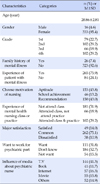Abstract
Purpose
This study was conducted to identify the effects of empathy, communication ability and attitude toward mental illness on psychiatric nurses' image for nursing students.
Methods
Participants were 349 nursing students from two universities in G metropolitan city. A survey was conducted from June 10 to 30, 2016, using a self-report questionnaire. Data were analyzed using t-test, one way ANOVA, Pearson correlation coefficients and multiple regression with SPSS/WIN 20.0.
Results
The level of psychiatric nurses' image for nursing students was 4.03±0.46. Models including the variables, empathy, communication ability and attitude toward mental illness explained 30.0% of the variance in the image of psychiatric nurses. Attitude toward mental illness was the most influential factor (β=.28, p<.001).
Figures and Tables
Table 2
Degrees of Empathy, Communication Ability, Attitudes Toward the Mental Illness, and Psychiatric Nurses' Image (N=349)

References
1. Cho YH. Relationship of psychiatric nurse image, job satisfaction and assertiveness of psychiatric mental health nurses. J Korean Acad Psychiatr Ment Health Nurs. 2014; 23(3):135–143. DOI: 10.12934/jkpmhn.2014.23.3.135.

2. Yang S, Lee KS, Lee JS, Kweon HJ, Lee MH, Oh KO, et al. Psychiatric mental health nursing. 5th ed. Seoul: Hyunmoonsa;2016. p. 798.
3. McKie A, Naysmith S. Promoting critical perspectives in mental health nursing education. J Psychiatr Ment Health Nurs. 2014; 21(2):128–137. DOI: 10.1111/jpm.12061.

4. Happell B, Martin T, Pinikahana J. Burnout and job satisfaction: a comparative study of psychiatric nurses from forensic and a mainstream mental health service. Int J Ment Health Nurs. 2003; 12(1):39–47. DOI: 10.1046/j.1440-0979.2003.00267.x.

5. Burnard P, Fothergill A. Community mental health nurses in Wales: Self-reported stressors and coping strategies. J Psychiatr Ment Health Nurs. 2000; 7:523–528. DOI: 10.1046/j.1365-2850.2000.00351.x.

6. Roberts DW, Vasquez E. Power: an application to the nursing image and advanced practice. AACN Clin Issues. 2004; 15(2):196–204.
7. Kalisch BJ, Begeny S, Neumann S. The image of the nurse on the internet. Nurs Outlook. 2007; 55(4):182–188. DOI: 10.1016/j.outlook.2006.09.002.

8. Saleema G, Rozina K, Samina V, Kausar K, Yasmin A, Judith M. A qualitative study of nursing leader's perceptions of professional empowerment amongst Pakistani nurses. Int J Nurs Educ. 2015; 7(3):247–251. DOI: 10.5958/0974-9357.2015.00174.9.

9. Kim WO, Kang HS. Changes of nurse's image perceived by nursing student as every clinical experience. J East West Nurs Res. 2004; 10(1):68–74.
10. Rogers D, Hudson C. The role of emotion control and emotional ruminations in stress management training. Int J Stress Manag. 1995; 2(3):119–132.
11. Kunyk D, Olson JK. Clarification of conceptualizations of empathy. J Adv Nurs. 2001; 35(3):317–325. DOI: 10.1046/j.1365-2648.2001.01848.x.

12. Tanzi S, Biasco G, Baile WF. Enhancing the empathic connection: using action methods to understand conflicts in end-of-life care. J Patient Exp. 2014; 1(1):14–21. DOI: 10.1177/237437431400100104.

13. Ji EJ. Influence of nursing professionalism, empathic ability on communication ability in senior nursing student. J Korean Data Anal Soc. 2014; 16(3):1685–1697.
14. Lee HS, Kim JK. Relationship among communication competence, communication types, and organizational commitment in hospital nurses. J Korean Acad Nurs Adm. 2010; 16(4):488–496. DOI: 10.11111/jkana.2010.16.4.488.

15. Lee KJ, Park HJ, Kim SS. A comparative study on the counseling self-efficacy and empathy of psychiatric nurses and general ward nurses. Nurs Sci. 2014; 26(1):9–19.
16. Yoon SJ, Beun EK, HA JS. A study on the difference of practicum satisfaction and attitudes toward mental disorder between nursing students and social welfare students who experienced psychiatric practicum. J Rehabil Res. 2007; 11(2):106–130.
17. Thornicroft G, Rose D, Kassam A. Discrimination in health care against people with mental illness. Int Rev Psychiatry. 2007; 19(2):113–122. DOI: 10.1080/09540260701278937.

18. Lee SY. The relationship between nursing students' social distance and attitudes toward the mentally disabled individuals [master's thesis]. [Daegu]: Kemyung University;2015. 61.
19. Seong JA, Yeom EY, Do YS. Image of nurses and nursing professional values perceived by nursing students. J Korea Contents Assoc. 2014; 14(11):798–809. DOI: 10.5392/JKCA.2014.14.11.798.

20. Jeong HS, Yoo YS. Image of nurses as perceived by nursing students and image determinants. J Korean Public Health Nurs. 2010; 24(1):29–38.
21. Davis MH. A multidimensional approach to individual differences in empathy. Cat Sel Doc Psychol. 1980; 10:85–100.
22. Park SH. The relationship between components of empathy and prosocial behavior. Korean J Educ Res. 1996; 35(5):143–166.
23. Hur GH. Construction and validation of a global interpersonal communication competence scale. Korean J Journal Commun Stud. 2003; 47(6):380–408.
24. Lee JH, Lee CS, Kwang TY, Hahn KS, Lee YM. A survey for community attitudes toward the mentally-ill in Suseo-lrwon area. Yong-In Psychiatry Bull. 1996; 3(2):188–202.
25. Cho YH, Kweon YR, Jo B. The validity and reliability of a psychiatric nurses’ image scale (PSYNIS). J Korean Acad Psychiatr Ment Health Nurs. 2015; 24(4):320–329. DOI: 10.7739/jkafn.2015.22.3.328.

26. Kim H, Yi M. Factors influencing empathy in nursing students in Korea. J Korean Acad Soc Nurs Educ. 2015; 21(2):237–245. DOI: 10.5977/jkasne.2015.21.2.237.

27. Ji EJ, Bang MR, Jeon HJ. Ego resilience, communication ability and problem-solving ability in nursing students. J Korean Acad Soc Nurs Educ. 2013; 19(4):571–579. DOI: 10.5977/jkasne.2013.19.4.571.

28. Choi MO, Park EJ. A study on change in attitudes and prejudice toward the mentally ill following metal health practice for social work students. J Korean Soc Welf Educ. 2007; 3(1):1–39.
29. Chung YH, Choe JS, Kim EH, Kim JS, Choi HK. A study on the stigma held by nursing college students against mental illness and mentally ill patients. Social Study. 2008; 16(2):195–210.




 PDF
PDF ePub
ePub Citation
Citation Print
Print






 XML Download
XML Download